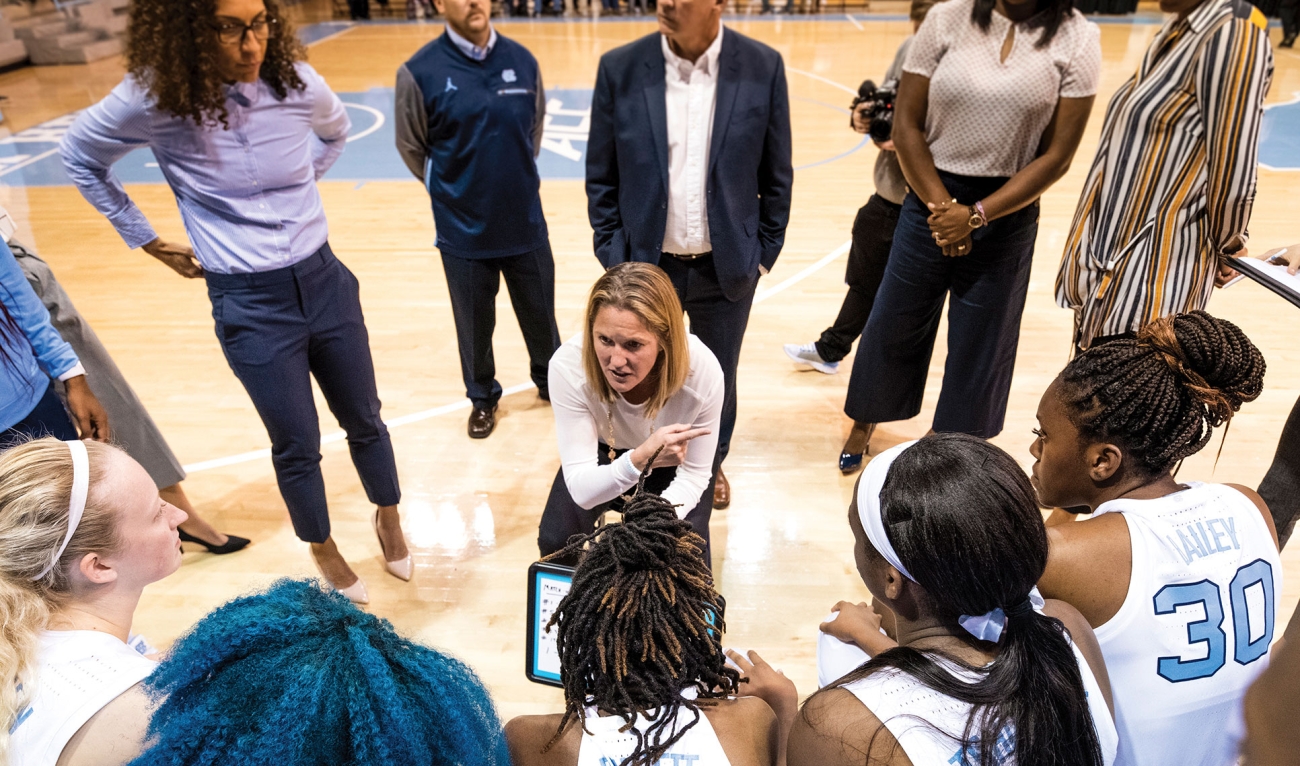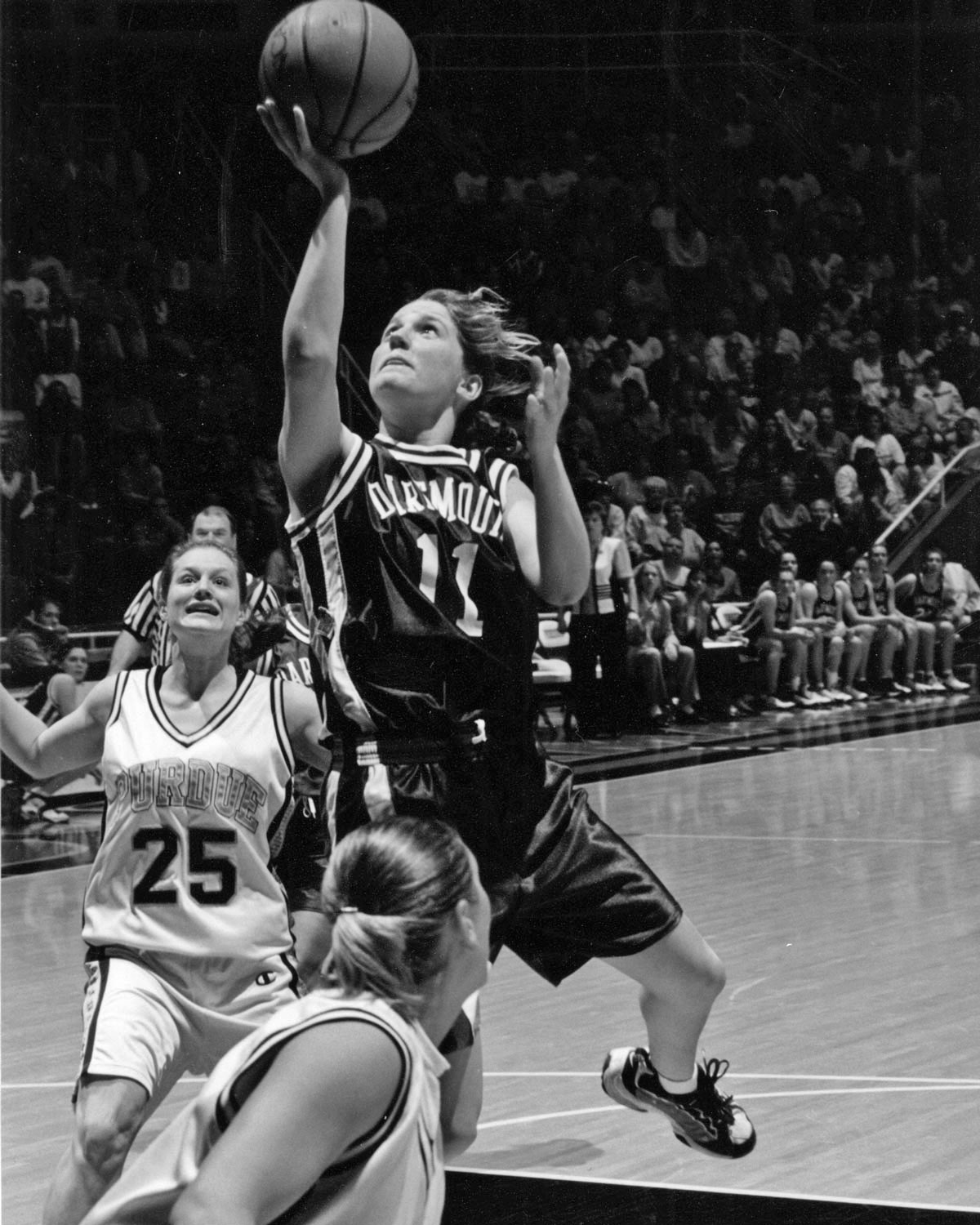Courtney Banghart ’00 Never Wrote “Coaching” On Her Bucket List
Courtney Banghart loves to tell the story about meeting legendary Tennessee coach Pat Summitt. Banghart, then in only her second year as an assistant women’s basketball coach at Dartmouth, had forgotten where she’d parked her rental car—and what it looked like—after a recruiting showcase at Disney’s sports complex during a flash flood.
“Hey coach, don’t you have an umbrella?” Summitt yelled over.
“I thought to myself, ‘Oh gosh, it’s Pat Summitt.’ I told her I’d try to remember one next time,” says Banghart.
“Well, get under here,” said Summitt, extending her umbrella.
Not only did the eventual 1,000-game winner offer Banghart shelter from the storm, Summitt had her driver take Banghart around the parking lot, row by row, until they found her rental. When Banghart ran into Summitt a year later at a restaurant and tried to thank her, Summitt responded by picking up Banghart’s check and sending the waiter to tell her, “Good luck finding your car.”
Fast-forward 20 years: Banghart, now in her fifth season at the University of North Carolina, has found much more as she leads her own perennial top-25 program. This spring, Banghart closed in on her 100th victory there and made her 11th NCAA tournament appearance as a head coach. Banghart—who holds half a dozen Dartmouth three-point shooting records—took charge of a Carolina program embroiled in turmoil after coach Sylvia Hatchell resigned in 2019. Players had alleged that Hatchell made racially insensitive remarks and forced them to compete through injuries. Banghart has since restored the winning tradition—on the court and in the classroom. “I want my players to be well educated,” Banghart says. “I want them to have a degree that matters. I want them to be surrounded by people who see them as true student-athletes.”
She also wants players who make good role models for her children, ages 10, 10, and 8, who frequently accompany their mom on road trips. “I tell parents, ‘I’m not recruiting a kid that I wouldn’t want around my children,’ ” she says.
Carolina forward Ciera Toomey bought into that recruiting pitch. “I feel like a lot of coaches think about the people they’re recruiting as players, but she’s also thinking about us as people,” says the first-year player. “I think it says a lot about her.”
Banghart’s responsibilities extend beyond Chapel Hill. She also serves as president of the Women’s Basketball Coaches Association. As college athletics undergo seismic shifts—conference realignment, a crowded transfer portal, and the money that comes with name, image, and likeness deals—the association faces no shortage of issues.
“We serve 380-plus Division I programs,” Banghart says, “but we also serve Division II, III, NAIA, and high school coaches. There’s a lot of different stakeholders in our game, and their perspectives are important. How can we continue to engage members to have some communication that allows us to grow the game the right way in an ever-changing landscape?”
Banghart never envisioned a coaching career after she graduated with a degree in neuroscience. In fact, at her first job out of college—coaching girls’ basketball and tennis at Episcopal High School in Alexandria, Virginia—Banghart went out of her way not to be viewed as only a sports authority. “I thought, ‘I can’t coach basketball with my Ivy League degree. That seems crazy,’ ” she says. “So I taught biology to freshmen and created a psychology course I would teach to seniors. I became a class dean and was the girls’ athletic director. I made sure I created enough other responsibilities that I wasn’t considered a coach.”
She returned to Dartmouth in 2003 as an assistant coach and earned a master’s in writing and leadership development. It was through her thesis—a 100-page history of sports leadership—that Banghart discovered coaching could indeed be her vocation.
In 2007, Princeton hired her to lead a Tigers program that had never been to an NCAA Tournament. “I actually didn’t know if I wanted the job,” Banghart says. “I wasn’t even wearing appropriate interview attire. I was just kind of like, ‘Well, let’s see.’ ”
It worked out. During the next 12 years, Banghart’s Tigers rewrote the Princeton record book and achieved success unheard of in the Ivy League. Among the highlights: seven Ivy League titles, six NCAA Tournament appearances, a 30-0 regular season record in 2014-15, a No. 8 seed in the NCAA Tournament, the first at-large NCAA bid in Ivy women’s basketball history, and the highest AP and coaches poll rankings (No. 13) in program history.
“It was a very low-risk opportunity,” Banghart says. “A lot of my peers said, ‘If you take a job when you’re not ready, and you get fired, you’ll never get another job.’ I said, ‘If I get fired, then I’m probably not that good at it, so I should do something else.’ The rest is history.”
Winning led to other job offers, but nothing Banghart wanted. Stanford head coach Tara VanDerveer—the NCAA’s all-time wins leader—helped Banghart be picky. “I had been offered some Power 5 jobs, high major conferences,” Banghart says. “I reached out to Tara, and she said, ‘I think the answer should be no. You need to take a good job, because we need good coaches in women’s basketball, and I think you’re a good coach.’ ”
When UNC came calling, Banghart knew the timing was right. “It was either stay forever in the Ivy League or get out now,” she says, “because I have the energy to do this one more time. I’m certainly glad I waited for a job like this.”
Banghart’s sister, Jen, has lived near UNC for 20 years, but even without that connection, Courtney feels at home. “This is very much like New Hampshire to me,” she says. “It’s a small college town. It’s a place I wanted to live. I want my family to grow up here.” Banghart is married to Michele DeJuliis, a former All-American lacrosse standout now in that sport’s hall of fame.
Last December at Mohegan Sun Arena, Banghart matched wits with renowned coach Geno Auriemma (one of her thesis interviewees) and the University of Connecticut in the final game of the Invesco QQQ Basketball Hall of Fame Women’s Showcase. Her Tar Heels maintained their composure in front of a hostile crowd and battled back from an early double-digit deficit to take a one-point lead late in the second quarter. Later, they ran out of gas and lost, 76-64.
Instead of brooding about defeat, Banghart buoyantly greeted two dozen special guests: the Dartmouth women’s team, which made the two-hour trip from North Andover, Massachusetts, following a 49-45 win over Merrimack. Recalling her own days leading the Big Green to two NCAA tournaments, Banghart cheerfully chatted with the Dartmouth players about their common ground, such as her old room in Topliff Hall, the neuroscience program, and Kappa Kappa Gamma sorority.
She also offered encouragement to the team, which has struggled under first-year head coach Linda Cimino. “Those of you who have been around a while have seen some adversity and long bus rides after losses,” Banghart told them. “I’m really grateful for those who have stuck with it because this crazy lady [Cimino] will fight.”
Banghart knows her audience. “Being an Ivy League student-athlete teaches you how to grind,” she says. “There are no shortcuts. There’s no, ‘I just don’t feel like doing that today.’ I left with a very strong sense of work, just ‘left foot, right foot, breathe, repeat.’ There were times in the middle of exams, or even just with a tough course, when that’s just the best that you can do that day.”
Banghart’s steadfast approach may well lead to UNC winning its second national title, something that eluded her at Princeton. “It’s still really hard, but I think I can do it,” she says. “I’ve got a shot.”
Elliot Olshansky lives in Commack, New York. He is the author of Robert’s Rules of Karaoke and the forthcoming Mommy’s Favorite Medal.












